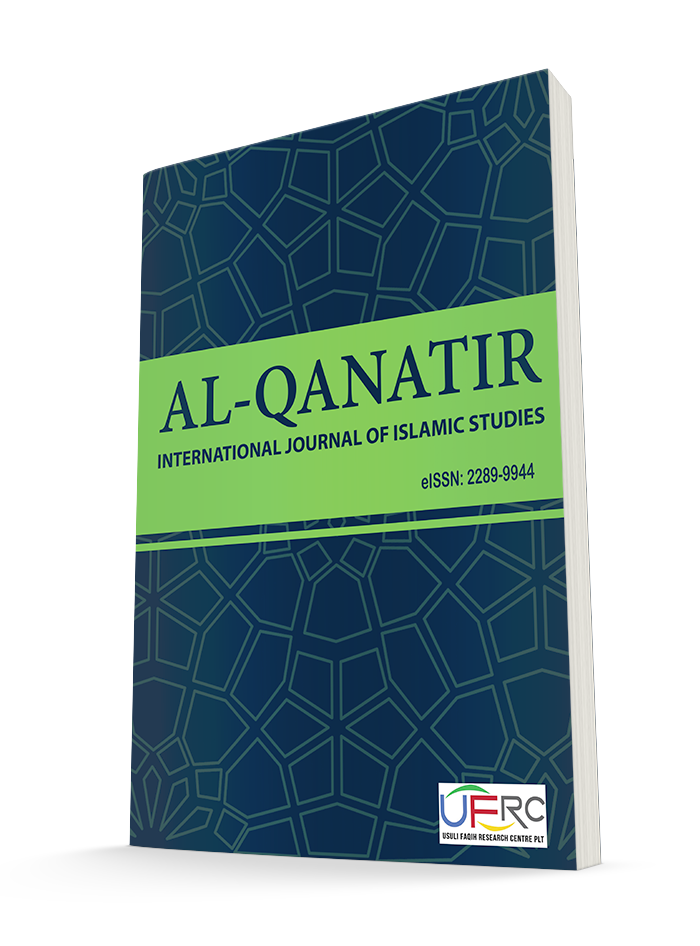Article

THE IMPACT OF ISLAMIC MODERATION METHOD IN ESTABLISHING SOCIAL PEACE IN KURDISTAN
أثر منهج الوسطيَّة الإسلاميَّة في ترسيخ السِّلم الاجتماعي في كردستان
Al-Qanatir: International Journal of Islamic Studies vol. 3 no. 1 (Page 40-55)View in JFatwa
Arif Ali Arif (Author)
Ardawan Mustafa Ismael (Author)
Abstract
The research aims to demonstrate the impact of Islamic moderation method in the establishment of social peace, and in putting it in accordance with the scientific curriculum. The researchers adopts the inductive method; to extrapolate Quranic texts and hadith; in order to consolidate the Islamic approach of moderation. Similarly, the researchers employs descriptive analytical method; for textual analysis and characterization. The research’s outcome has shown that al-wasatiyyah is moderation, i.e. to recognize the opposite partyby giving each party the right it deserved, without injustice and tyranny. The social peace is a positive manifestations in society, and in removing the negative aspects. The research also explained that the Quran and the Hadith have established the principles of moderation, incited Muslims to adopt the method and revealed that the characteristics of this approach were built on justice, wisdom, convenience and discipline. It shows also that moderation has undesirable effects on community members, and that the Kurdistan region of Iraq which represented by its authentic people had pursued a method of peaceful coexistence between the different components of the people, and the Islamic discourse which represented by religious institutions in the region have a vital role in consolidating the moderation concepts in the heart and mind of the Kurdish individual; such as tolerance, coexistence, and renunciation terrorism and extremism. The moderation approach is the one which makes the fiqh difference fertile ground; inadvertently bring the different sects, and the source of a tender for the developments of life, not a way to an exchange of accusations and attack each team over the other, and bigotry to those who belong to it.
Keywords: Moderation, social peace, positive manifestations, justice, Kurdistan.
تهدِف فكرة البحث إلى تبيان أثر منهج الوسطية الإسلامية في ترسيخ السِّلم الاجتماعي، وطرحها وَفق المناهج العلمية. وقد انتهج الباحثان في الكتابة المنهجَ الاستقرائي؛ لاستقراء النصوص القرآنيَّة، والأحاديث النبوية؛ من أجل تأصيل منهج الوسطية الإسلامية. وكذلك المنهج التحليلي الوصفي؛ لتحليل النصوص وتوصيفها. وقد أبان البحث أنَّ الوسطية هي الاعتدال، والاعتراف بالطرف المقابل، وإعطاء كل طرف حقه، دون حيفٍ ولا طغيانٍ، وأنَّ السلم الاجتماعي عبارةٌ عن المظاهر الإيجابية في المجتمع، وإزالة المظاهر السلبية فيه.كما أوضح أنَّ القرآن الكريم والحديث النبوي قد رسخا مبادىء الوسطية، وحرَّضا المسلمين على انتهاج منهجه، وكشف أنَّ من خصائص هذا المنهج ابتناءه على العدل والحكمة، واليسر المنضبط. وأنَّ للوسطية آثارًا محمودةً على أفراد المجتمع، وأن إقليم كردستان العراق ممثلاً بشعبه الأصيل قد انتهج منهج التعايش السلمي بين مكوِّنات الشعب المختلفة، وكان للخطاب الإسلامي ممثلاً بالمؤسسات الدينية في الإقليم دورٌ حيوي في ترسيخ مفاهيم الوسطية في قلب وعقل الفرد الكردي؛ كالتسامح، والتعايش، ونبذ الإرهاب، والتطرف. وإنَّ منهج الوسطية هو الذي يجعل الاختلاف الفقهي أرضًا خصبةً؛ قصد التقريب بين المذاهب المختلفة، ومصدر عطاءٍ لمستجدَّات الحياة، لا سبيلاً لتراشق الاتهامات، وتهجُّم كل فريقٍ على الآخر، وتعصبٍ أعمى لمن ينتمي إليه.
الكلمات الافتتاحية: الوسطية، السِّلم الاجتماعي، المظاهر الإيجابية، العدل، كردستان.
References
Abu Dawud, Sulayman bin al-Ashcath al-Sijistaniyy al-Azdiyy. N.d. Sunan Abi Dawud. N.p: Dar al-Fikr.
Abu al-Husayn Ahmad bin Faris bin Zakariyya. 1999. Mucjam Maqayis al-Lughah. Beirut: Dar al-Jayl.
Abu Zahrah, Muhammad. N.d. Tarikh al-Madhahib al-Islamiyyah. Cairo: Dar al-Fikr al-cArabiyy.
cAssaf, Muhammad Mutlaq. 2012. Al-Tawassut Fi al-Khitab al-Diniyy Wa Atharuhu cAla al-Silm al-Ijtimaciyy. Mu’tamar Kulliyyat al-Sharicah al-Dawliyy al-Thaniyy. Jamicat al-Najah al-Wataniyyah, Palestine.
Al-Bukhariyy, Muhammad bin Ismacil Abu cAbdillah al-Jacfiyy. 1987. Al-Jamic al-Sahih al-Mukhtasar. Ed. 3. Beirut: Dar Ibn Kathir.
Al-Fayyumiyy, Ahmad bin Muhammad bin cAliyy al-Muqriyy. N.d. al-Misbah al-Munir Fi Gharib al-Sharh al-Kabir Li al-Raficiyy. Beirut: al-Maktabat al-cIlmiyyah.
Ibn Hajar Al-cAsqalaniyy, Ahmad bin cAliyy bin Hajar. 1379H. Fath al-Bari. Beirut: Dar al-Macrifah.
Ibn Hibban, Muhammad bin Hibban bin Ahmad Abu Hatim al-Tamimiyy al-Bastiyy. 1993. Sahih Ibn Hibban Bi Tartib Ibn Balban. Beirut: Mu’assasat al-Risalah.
Ibn Kathir, Ismacil bin cUmar al-Dimashqiyy. 1999. Tafsir al-Qur’an al-cAzim. Ed. 2. N.p: Dar Tayyibah.
Ibn Manzur, Muhammad bin Makram al-Afriqiyy al-Misriyy. N.d. Lisan al-cArab. Ed. 1. Beirut: Dar Sadir.
cIsam Ahmad al-Bashir. 2012. Khususiyyat al-Hadarat al-Islamiyyah. Kuwait: al-Markaz al-cAlamiyy Li al-Wasatiyyah.
Majallat al-Majmac al-Fiqh al-Islamiyy. 1989. Vol. 3. Year. 2. Makkat al-Mukarramah: Rabitat al-cAlam al-Islamiyy.
Mayy cUmar Nayif. 2012. Lughat al-Hiwar Wa Atharuha cAla al-Silm al-Ijtimaciyy. Mu’tamar Kulliyyat al-Sharicah al-Dawliyy al-Thaniyy. Jamicat al-Najah al-Wataniyyah, Palestine.
Muslih al-Salih. 1999. Al-Shamil Qamus Mustalahat al-cUlum al-Ijtimaciyyah. Ed. 1. Saudi: Dar cAlam al-Kutub.
Muslim bin al-Hajjaj Abu al-Husayn al-Qushayriyy al-Naysaburiyy. N.d. Sahih Muslim. Beirut: Dar Ihya’ al-Turath al-cArabiyy.
Al-Nawawiyy, Muhy al-Din Yahya bin Sharaf. 1392H. Sahih Muslim Bi Sharh al-Nawawiyy. Ed. 2. Vol. 16. Beirut: Dar Ihya’ al-Turath al-cArabiyy.
Al-Sacdiyy, cAbd al-Rahman bin Nasir. 2000. Taysir al-Karim al-Rahman Fi Tafsir Kalam al-Mannan. Beirut: Mu’assasat al-Risalah.
Al-Qaradawiyy, Yusuf. 2011. Kalimat Fi al-Wasatiyyah al-Islamiyyah Wa Macalimuha. Ed. 2. Kuwait: al-Markaz al-cAlamiyy Li al-Wasatiyyah.
Al-Tabariyy, Muhammad bin Jarir bin Yazid bin Khalid. 1405H. Jamic al-Bayan cAn Ta’wil Ayi al-Qur’an. Beirut: Dar al-Fikr.
Al-Yahyiyy, cAbdullah bin cAbd al-cAziz. 2008. Al-Wasatiyyah al-Tariq Ila al-Ghad. Riyad: Dar Kunuz Ishbiliya.
Al-Zuhayliyy, Wahbah. 2011. Al-Wasatiyyah Matlaban Sharciyyan Wa Hadariyyan. Kuwait: al-Markaz al-cAlamiyy Li al-Wasatiyyah.
URL
Back View in JFatwa

